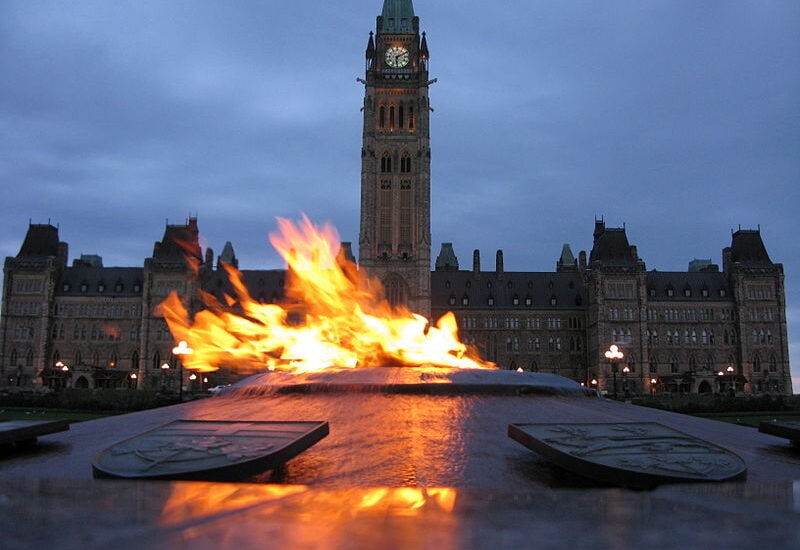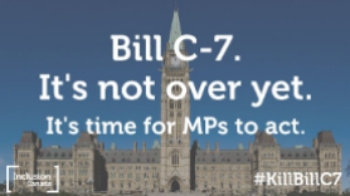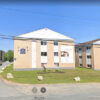
KJIPUKTUK (Halifax) – Concerns have been voiced about the amendment to Bill C-7 that proposes removal of “a naturally foreseeable death” as criteria in accessing Medical Assistance in Dying (MAiD). The proposed legislation was reviewed before the Senate and is now back before the House of Commons,
From Senator Marilou McPhedran’s passionate speech to articles by Harold Braswell’ in the Washington Post and by Ameil Joseph from McMaster University, all express that removing the clause of “a naturally foreseeable death” as the needed requirement to access MAiD poses a risk—we would say poses a deadly risk—for persons identified as vulnerable, or suffering in racialized poverty, or considered living and suffering with disabilities.
These are all individuals whose experiences of suffering are not related to “a naturally foreseeable death” but who may face pressure to utilize MAiD due to their suffering that is a consequence of systemic and structural discrimination and mistreatment.
Senator McPhedran spoke of how a coalition of over 90 experts, from disability rights organizations to United Nations experts on the human rights of persons with disabilities, to those living in poverty, and concerning the rights of older persons which relates to ageism, have expressed to the Canadian Government concerns that “this Bill is highly likely to produce dangerous and discriminatory situations.”
Joseph’s article reflects on Canada’s history of eugenics, systemic racism, and discrimination. And Braswell gives voice to Roger Foley, who’s suffering, although living with a degenerative neurological condition, was because of being neglected, physically abused, and given rotten food over a number of days by a home care agency. When hospitalized the option offered to him was MAiD rather than care that was respectful and promoted his human dignity.
Mental suffering
An expansion on the concerns expressed by McPhedran, Braswell, and Joseph was voiced by Senator Denise Batters. She asserts that individuals made vulnerable by mental illness such as suffering suicidality will be offered or encouraged suicide assistance if “a naturally foreseeable death” revision is removed from Bill C-7 as the needed requirement to access MAiD.
Finding caring ways that offer hope and healing is necessary in supporting an individual’s right to life, she reiterates that to do no harm mandates that the State should not have the right to put an individual to death for reasons that are structural and socially discriminatory. The Canadian Mental Health Association (CMHA) statement would support Senator Batter’s concerns. The CMHA is urging MPs to vote against the amendments to Bill C-7 passed by the Senate.
Sexism and non-state torture suffering poses risks
Batter’s speech became professionally personal. As nurses it caused us to recall the unforgettable time when first reading of a woman in the Netherlands who was granted a medically assisted death. Her unbearable suffering related to a diagnosis of depression. Reading deeper, her story becomes distinctly sexist. She and her children were living with an abusive spouse and father, her two sons died by suicide; these losses brought unbearable grief and suffering—the remedy was medically assisted death—or suicide.
There is, from our perspective, a flawed and dangerous risk to Bill C-7 that may not as yet have been considered—in particular the consequences of societal sexism and relational violence. It is our concern, experienced over the past 28 years of developing supportive care for women who have suffered massively as a consequence of being born into families or having married a male spouse who were non-state torturer-traffickers.
Non-state refers to private individuals whose pleasure was and is gained when inflicting all forms of sexualized torture. Being tortured inflicts overwhelming and unbearable physical and emotional pain which causes women’s and girls’ bodies to dissociate, this is their body’s effort to keep them alive. Surviving can bring suicidal suffering that becomes an everyday, even every moment of every day suffering that can linger for decades. This was our Nova Scotia experience when providing supportive care to women.
We went underground in our caring because the system had no safe place for women to be heard, let alone believed that they had been tortured. In our soon to be released book, Women Unsilenced Our Refusal To Let Torturer-Traffickers Win, we disclose how underground we were as we provided hope and recovery and at the same time struggled against what we call political cruelty—political cruelty in Canada. We coined this term because it did not matter how many times we explained the massive suffering being tortured caused women and girls, and spoke of the need to name and criminalize non-state torture as a crime of torture, our concerns fell on politically deaf ears. It appears this is similarly occurring during these Bill C-7 discussions.
We both previously included our concerns in the civil society feedback survey on MAiD done by the Department of Justice.
We wrote to Senator Denise Batters on December 14, 2020, about her expression of “state sanctioned suicide” relating to MAID. We wrote that:
For . . . years of supporting Canadian women who were tortured and trafficked by their parents and others who were supposed to be responsible for their care. The women tell us that as children they were taught by these adults to end their lives via suicide if they ever told anyone about the non-State torture (NST) they endured or named the perpetrators. They carry this process forward with them into their adult lives thus suicidal ideation is a constant reality for women who have endured NST.
It is for this very reason we have serious concerns that women who have endured NST will consider requesting MAID if they get triggered after sharing their ordeals of torture or for even thinking of telling. Dissociation is a normal survival response to NST so the women may not even be conscious of the reason they are requesting MAID. If their request is approved this would indeed become state sanctioned suicide. NST is a very complex crime and human rights violation and since Canada does not include NST in our Criminal Code there are no specialized services for victimization-traumatization care for women trying to heal. These women survivors are so invisibilized within the Canadian support system they could die assisted by the State never receiving the equality, dignity, justice and healing they so deserve.
This describes, based on our knowledge, the suffering associated with the inherent risks that sexism combined with violence that amounts to non-state torture can present when removing the clause of “a naturally foreseeable death” as the needed requirement to access MAiD.
Because as a society the impact of sexism, female human rights inequality, and the dismissiveness of the suffering caused by such violence committed against women and children poses, the risk is that the State will slide onto a slippery slope of dispensing women’s NST victimization and suffering versus caring about them socially and structurally.
“The dismissal of the suffering caused by sexism and violence became painfully evident”
This dismissal of the suffering caused by sexism and violence became painfully evident to us when we stood up at an annual meeting of the Canadian Federation of University Women to oppose their resolution as written in support of Medical Assistance in Dying. Our opposition was for our specific concerns and also similar to some of the reasons quoted and referenced in this article. Standing up to explain our opposition was greeted with laughter so loud that it drowned out our concerns. It is an ongoing challenge to dig deep into all the biases and limited insights each of us sometimes unknowingly have. We hope that our sharing may provide insights into the lives of women and girls that sexism and non-State torture victimizations create and embrace such risks into the discussions about Bill C-7.
So what to do?

It’s time to contact your MPs as it’s not over yet.
Are you facing intimate partner violence? Here are some Nova Scotia resources that can help, as compiled by the CBC

Jeanne Sarson, MEd, BScN and
Linda MacDonald, MEd, BN
Co-founders Persons Against Non-State Torture (NST)
Human Rights Defenders
361 Prince Street, Truro, NS, Canada B2N 1E4
P: 1.902.895.6659 | C: 1.902.956.2117 | twin2@eastlink.ca
www.nonstatetorture.org
contact@nonstatetorture.org
See also: What’s a misogynist? It’s the choice to be a hater of women!
Check out our new community calendar!
With a special thanks to our generous donors who make publication of the Nova Scotia Advocate possible.
Subscribe to the Nova Scotia Advocate weekly digest and never miss an article again. It’s free!



